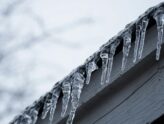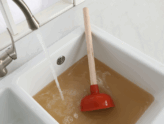Preventing Frozen Pipes: A Homeowner's Winter Survival Guide
Winter’s icy temperatures put unprepared pipes at risk of freezing and potentially bursting. The repairs are costly and the damage extensive.
Before you have to call the professionals at Caldwell Plumbing for an emergency plumbing repair, preventing frozen pipes takes prep work in the fall. If you own a home, here is your homeowner’s winter survival guide to prevent frozen pipes.
Why Frozen Pipes Are a Problem
When water freezes in a pipe, it expands. This puts excessive pressure on your plumbing pipe from the inside, resulting in cracks and bursting.
The possibility of a frozen pipe does not apply exclusively to exterior plumbing. The areas of the home most vulnerable to frozen pipes include any unheated spaces, such as attics, basements, and crawl spaces.
Identify Vulnerable Pipes to Insulate
Identify vulnerable pipes around your property that require insulation prior to winter. Any pipes near windows, exterior walls, or uninsulated areas fit the bill.
Prevent Frozen Pipes with Insulation
Properly installed insulation is a large part of how to prevent frozen pipes. Insulation for plumbing can be purchased at many hardware stores or is something a plumber can assist with. Fit a foam sleeve, heat tape, or pipe wrap around vulnerable pieces of your plumbing. This is inexpensive, takes mere minutes to complete, and it works.
Winterize Outdoor Faucets
Shut off and drain outdoor faucets. Remove and put into storage sprinkler systems. Any hose you have connected should be drained, removed, and put into storage as well. Use faucet covers for protection as well.
What You Can Do During Winter to Prevent Frozen Pipes
Keep the Cold Air Out
Cold air is the enemy when it comes to exposed plumbing in winter. Seal gaps and cracks in walls where cold air can enter.
Let Your Faucets Drip
Let faucets connected to vulnerable pipes drip slightly when temperatures drop below freezing. This reduces pressure inside the pipe and can prevent a possible burst.
Keep the Heat On
Maintain consistent heat in your home, even when you are away. Set the thermostat no lower than 55 degrees Fahrenheit. This is warm enough to protect your pipes around the house.
Open Cabinet Doors
Leave cabinet doors under sinks open to allow warm air to circulate around pipes. Do this in the bathroom and kitchen.
Signs of Frozen Pipes
- Lack of water flow from faucets or showerheads.
- Frost on exposed pipes around your home, such as in basements, crawl spaces, or garages.
- Unusual odors emanating from drains.
- Unusual sounds, such as banging or clanking when you turn on a faucet, can be caused by the expansion of ice within the pipe.
What to Do When Pipes are Frozen
Locate the Frozen Area
The first step in what to do when pipes freeze is to determine which pipes are frozen. Check the faucets in your home if you have any question about whether a plumbing line has a freeze somewhere in it or not. If only one area is affected, the frozen pipes may be localized.
Open the Frozen Faucets
Let a small amount of water drip from your frozen faucets. This gradually relieves pressure within the pipes and does so in the safest way. This is how you reduce the likelihood of a burst.
Apply Heat Directly to the Pipe
Gently warm frozen pipes using a hair dryer, space heater, electric heating pad, or similar means. Begin at the faucet and work your way down toward the frozen section.
Please note: Never use an open flame or high-intensity source of heat to warm a pipe.
Insulate Your Pipes Again
After the freeze in the pipe is handled, insulate the exposed pipes again with foam pipe insulation or heat tape. This should prevent future freezes.
Contact a Plumber For Frozen Pipes
If there has been a burst or another issue has presented itself from pipes that have frozen, call a plumber. Burst pipes are one of the most common causes of property damage during winter and the longer water damage persists, the less affordable it is to resolve.
Prevent Frozen Pipes with a Caldwell Plumbing Pre-Winter Inspection
Taking preventative action before winter hits is key to protecting your plumbing. Schedule a plumbing inspection at Caldwell Plumbing before we hit the coldest weeks of the winter season. Winterize your home with the help of a professional and ensure your pipes are ready for the colder months ahead.
The team at Caldwell Plumbing can help you stay vigilant and take proactive measures to safeguard your home and keep your pipes warmed and protected. Reach out today!
















